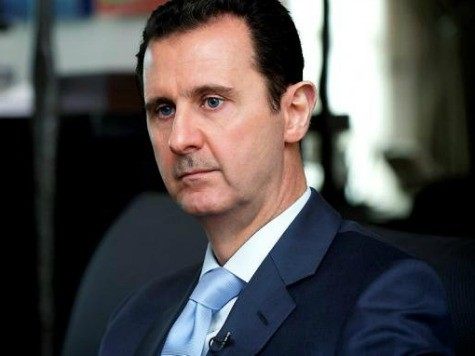Syrian President Bashar al-Assad gave a half-hour interview to the BBC on Tuesday in which he discussed, among other things, just how much his government is cooperating with the United States and its anti-ISIS coalition.
Assad is a de facto ally of the Western powers that called him a war criminal and demanded his ouster not long ago–the other side of the war comprised of the Islamic State, its supporters, other Sunni jihadist groups, and allegedly “moderate” rebels whose alliances fall with neither Assad nor ISIS. But has that alliance against the Islamic State and other unsavory members of the Syrian resistance become official?
Is there coordination between Syria and American air forces through back channels?
No, said Assad, who insisted there was no “direct co-operation” or “dialogue” between Syria and the United States. He suggested that “third parties” from “Iraq and other countries” occasionally convey “general messages”–perhaps, as his interviewer Jeremy Bowen suggested, courtesy warnings about impending American air strikes on Syrian territory. He said Syria was warned before the American air campaign got under way, but “nothing tactical” is being shared.
The Syrian dictator did not express any conciliatory feelings toward his new de facto allies in the interview. He continues his habit of describing the entire Syrian resistance–from ISIS head-choppers to the “moderates” beloved of Western policymakers–as a pack of “terrorists,” and therefore accused the United States of cooperating with terrorists. He leveled a similar complaint against Saudi Arabia, which he noted was the source of the extreme Wahhabi sect of Islam. He also complained about the anti-ISIS air campaign violating Syria’s territorial integrity.
There is some grim humor to be found in watching Assad refuse to concede the smallest bit of personal error in the grim and horrifying recent history of Syria. Humility and self-criticism are no more a part of his verbal toolbox than any other authoritarian ruler. Thus, we have him comically describing his regime and its military as “fulfilling their duty toward the Syrian people” and rejecting the classification of Syria as a “failed state,” even though hundreds of thousands of his people are dead–quite a few of them at his hands--and large chunks of his territory have been gobbled up by the Islamic State.
Even better is when Bowen tries to pin him down on an earlier “mistakes were made” comment about his violent response to early demonstrations against his rule, and Assad insists, in essence, that what he said was “anyone could make mistakes,” but he personally did not. Authoritarians with gigantic egos do not admit to making mistakes.
Another thing Assad does not want to admit to is the indiscriminate use of “barrel bombs” against rebel positions, inflicting horrific collateral damage upon nearby civilians. The dictator even tried to make a joke of it, saying that maybe his army was using cooking pots for bombs instead of barrels.
The BBC relays a sharp response to this portion of the interview from British Foreign Secretary Philip Hammond, who noted the Assad regime’s use of such weapons is well-documented, and snapped that Assad is “deluded or lying when he says his military are not murdering hundreds of innocent civilians with the use of barrel bombs.”
Interviewer Jeremy Bowen, who is the BBC’s Middle East editor, said in a post-interview analysis that “the barrel bomb has become the most notorious weapon in the regime’s arsenal,” and that he had personally seen the results of such a detonation in Damascus several years ago. “It was a flippant response,” he said of Assad’s denial. “The mention of cooking pots was either callousness, an awkward attempt at humor, or a sign that Mr. Assad has become so disconnected from what is happening that he feels overwhelmed.”
Assad did not seem very “overwhelmed” when callously defending his use of starvation tactics against insurgent forces, a practice that has caused a great deal of suffering among civilians in the targeted areas. All the true “civilians,” he claimed, ran out of those towns and suburbs when “terrorists” and “militants” took over, so there aren’t any true “civilians” left to suffer when food and medicine are cut off.
Assad sought to score a debate point against United Nations human-rights complaints by suggesting that, since areas under siege by his forces can still get their hands on munitions to fight back, they must be able to get food, too, so any starvation that might be occurring is not his fault. For an encore, he tried responding to a plea for mercy from a teacher whose school was shelled by the Syrian army by arguing that good leaders don’t shell schools, and since Bashar al-Assad is a very good leader, he must not have shelled that school.
We’ve come a long way from President Obama’s mumbling about chemical-weapons “red lines” and Syrian regime change. That was a long way from Hillary Clinton proclaiming Bashar al-Assad to be a great reformer, shortly before the Syrian uprising began.
Now that Assad’s most effective military adversaries are the target of American bombing, coupled with ground actions from allied Kurdish forces, it is clear that eliminating him is currently not an option, and it almost sounds like he is fishing for more of that “great reformer” praise. He might even get it–if Clinton ends up in the White House. Democrats won’t want to admit that the ultimate outcome of Obama’s confused Syria policy was a murderous dictator kept more securely than ever upon his throne, thanks in part to American military action.

COMMENTS
Please let us know if you're having issues with commenting.